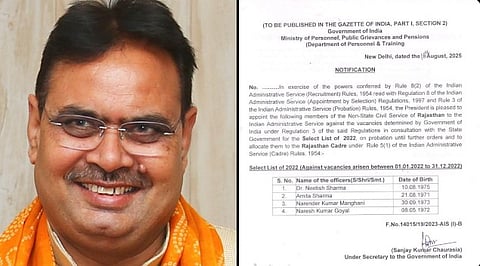
New Delhi/Jaipur: A major controversy has erupted over the selection process for the Indian Administrative Service (IAS) in the Rajasthan cadre. It is alleged that a committee headed by Chief Secretary Sudhanshu Pant deliberately ignored 14 eligible officers from the Scheduled Caste (SC), Scheduled Tribe (ST), and Other Backward Classes (OBC) categories, selecting only officers from the Savarna community for all four vacant posts. This move is being widely condemned as a violation of the Constitution and the fundamental principles of social justice.
The case pertains to selections under the 'Non-State Civil Service' quota, where officers from the state civil services are promoted to the IAS. Hansraj Meena, founder of the 'Tribal Army', has raised serious objections to this outcome. He cited a notification issued by the central government and data from the selection process to level these grave allegations.
According to Meena, interviews were conducted for a total of 18 officers for this selection process. Of these, 14 officers were from the SC, ST, and OBC categories, while only 4 officers were from the Savarna community. Shockingly, not a single officer from the SC/ST/OBC categories found a place in the final selection list, with all four selected officers belonging to the Savarna community. The selected officers are Dr. Neetish Sharma, Amita Sharma, Narender Kumar Manghani, and Naresh Kumar Goyal.
A notification issued by the central government on August 8, confirmed the appointment of these four officers to the Rajasthan cadre. This selection was for the 2022 Select List, meant to fill vacancies that arose between January 1, 2022, and December 31, 2022. However, the fairness of the selection process is now under serious scrutiny.
Hansraj Meena reacted sharply, stating that sidelining 14 eligible SC/ST/OBC candidates and awarding all seats to a single caste is an open disregard for the Constitution and social justice. He tweeted, "This is clearly injustice. The Constitution states that everyone has an equal right. But when all seats are given to only one caste, it is against both the Constitution and social justice." He has demanded an immediate explanation from Rajasthan Chief Minister Bhajanlal Sharma and challenged that if a response is not provided, the Chief Minister should resign from his post.
The OBC Mahasabha too has condemned the selection process and alleged caste biasedness. The organisation termed it a violation of constitutional process.
Rajasthan Congress President Govind Singh Dotasara also launched a scathing attack on the state government. In a x post, he wrote, "The government could not find a single eligible officer from the SC, ST, OBC, MBC, and Minority categories! This is precisely why the Leader of the Opposition in the Lok Sabha, Rahul Gandhi, is in favor of a caste census, to ensure social justice and so that everyone can get a share proportional to their population.
In the selection process, eligible officers from all categories have always been given equal opportunity based on merit and seniority. But for the first time in the state's history, all four seats have been filled only from the general category. This is a clear case of showcasing a casteist mentality.
The BJP government, which came to power by taking the votes of 36 communities (a reference to castes as Chattes kaum), is accountable not to officers with a casteist mindset, but to the public."
This issue has once again raised serious questions about the transparency and fairness of the selection process in civil services. It is noteworthy that a petition is pending in the Supreme Court regarding the application of the 'Creamy Layer' concept to SC/ST reservations, which argues for providing reservations based on economic criteria.
Critics of excluding the 'Creamy Layer' from reservations argue that during the Round Table Conferences of 1930-32 and the debates of the Constituent Assembly, Babasaheb Ambedkar advocated for ensuring social representation for all SC/ST individuals, regardless of their economic status. Critics state that even economically well-off SC/ST individuals face caste-based discrimination, such as false allegations at work, dismissals, or postings to lower positions. If they are excluded from reservations, they will be forced to compete in the general category, where biased selection boards can disadvantage them.
You can also join our WhatsApp group to get premium and selected news of The Mooknayak on WhatsApp. Click here to join the WhatsApp group.